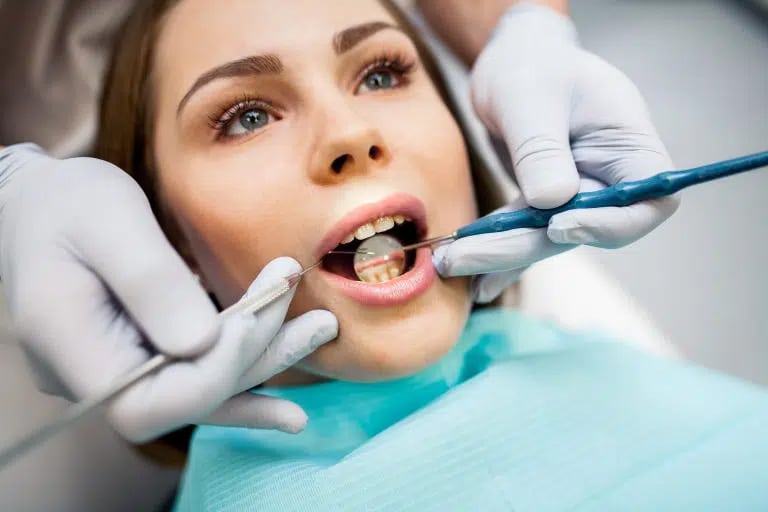How To Overcome Your Fear of The Dentist?
Do you know that many people worldwide don’t go for dental treatments due to a high sense of dental fear?
A study by The University of Adelaide confirms that one in every six Australian adults shows intense fear of the dentist. Similarly, adults fears the dentist. Similarly, one in every ten Australian children also fears dental procedures. Almost five per cent of Australians experience dental phobia, a level of extreme fear that significantly affects the quality of a patient’s life.
Most people show some level of fear of dental procedures due to the pain or previous bad experiences. However, this fear of dentists that refrain people from taking the required treatment is a situation that needs immediate attention.
The level of dental anxiety varies from person to person due to several factors, such as the patient’s characteristics, gender, age, socio-economic status, and education. However, regardless of these factors, anyone can show high dental anxiety behaviour.
Different Types of Dental Fear
When it comes to fear levels, patients can be classified into three categories: fearful patients, anxious patients, and phobic patients.
A fearful patient possesses the normal emotion of fear out of their sense of response to the dental and surgical procedures on the face and the mouth.
On the other hand, anxious patients fear something unpleasant and painful will happen, though it may not happen in reality.
PPhobic patients show extreme dental fear and do not cooperate with or go for dental treatments, regardless of their severe dental condition. Phobic patients often face various dental problems, both short-term and long-term, as they do not seek the assistance of dentists.
One of the common reasons for dental fear is because of painful dental treatments people have experienced in the past.
While some people show fear of the dentist, some others show fear of pain. A significant percentage of people are afraid of any dental drilling and want to keep themselves away from dental tools. Do you know many people show serious anxiety, even when they hear the sound of the drill?
The Consequences of Dental Anxiety

Be it dentist anxiety or dental fear, people who showcase it experience some serious consequences.
- People who showcase it experience some serious consequences, whether dentist anxiety or dental fear.
- People who experience dental fear usually do not consult with dentists or often delay or cancel the treatment process, even when it is highly required.
- Dentists face difficulty in treating both adults and children who have dental fears. Considering the behavioural problems of such people, it usually takes a long time to complete the treatment process.
- Treating dental fears is an unpleasant and stressful experience for dental specialists and patients. Researchers have concluded that treating such patients causes considerable stress to dental specialists.
- The absence of timely dental treatment leads to more complex dental issues that demand complicated treatment processes. It again adds to the stress of both patients and dental practitioners.
- People with dental fear often experience various dental issues, such as severe gum disease, poor dental health, chronic bad breath, and much more. They also showcase low self-esteem due to stains, heavy tartar, and cavities in their teeth.
- The poor dental health of such people can lead to other critical health conditions such as stroke, Alzheimer’s disease, diabetes, heart disease, premature birth, and rheumatoid arthritis.
- Poor oral health can affect a person’s quality of life, including their ability to drink, eat, speak, and socialise.
What Are You Afraid Of? Recognising Your Fear Is the First Step
Understanding your fears is the first step in overcoming dental phobia. Here are some common reasons people might be afraid of the dentist:
- Pain: The fear of experiencing pain during dental procedures can be a major concern. People worry that treatments might hurt or cause discomfort.
- Loss of Control & Fear of the Unknown: Feeling helpless or not knowing exactly what will happen during a dental visit can lead to anxiety. Being in an unfamiliar situation and not having control over it can be not very comforting.
- Embarrassment about Dental Health: Some individuals feel self-conscious about the condition of their teeth and gums. They might be worried about judgment from the dentist or dental staff.
- Bad Experience in the Past: A negative encounter with a dentist, whether due to pain, poor treatment, or an uncomfortable situation, can create lasting fear and anxiety about future visits.
Recognising which factors resonate with you can help you address your dental phobia. Once you understand the root of your fear, you can work towards finding strategies to manage it and make dental visits more comfortable.
Tips To Overcome Dental Fear
With some smart tips and choices, people can overcome dental fear to a large extent. While these strategies do not work for everyone, they can produce positive results for most people.
Seek The Assistance of The Right Dental Specialist
When you want to address the fear of dental treatments, ensure that you choose the services of the right dental clinic and dentist. You can search for dental specialists who offer qualified treatments for patients with dental anxiety.
You can also call the dental clinic to confirm that they accommodate your requirements. Additionally, you can visit the dental clinic and meet the dentist to ensure that you are getting a relaxed environment there.
Some dental clinics offer special treatment options for people with dental anxiety. Bay Street Dental Group provides sleep dentistry solutions to people who struggle with fear of dentist issues. Our sleep dentistry solutions are designed to help patients relax and offer them a stress-free dental treatment experience.
Active Two-Way Communication with Your Dentist
Communicating with your dentist is the most important step for overcoming dentist anxiety. You can share your apprehensions, concerns, and fears with the dentists and help them design a suitable treatment plan based on your needs. Effective two-way communication may relax some patients and allow them to proceed with the treatment.
Find Smart Strategies to Reduce Your Fears
You can reduce your dental fear through smart steps. You can start with milder treatments and get experienced with the treatment environment before moving to complex treatment procedures.
You can also ask a friend or a family member to accompany you. It can make you feel more supported.
While undergoing the treatment, you can play with distraction strategies to divert attention from fear. You can count on yourself, listen to music, and fiddle with stress balls to relax during the dental procedure.
Practice Relaxation Techniques

This is another great option to keep yourself calm before the dental treatments and during the procedure. You can pray, meditate, or visualise things to relax from the dental fear. Breathing techniques techniques also can help you to reduce your heartbeat and relax you.
Get The Assistance of a Psychologist
People who face a high fear of dental procedures can consult with a psychologist. Since psychologists manage different kinds of phobias, they can address the extreme fear of people. They provide comprehensive solutions to many intense phobia conditions.
Sleep Dentistry: The Ultimate Solution for The Fear Dental Procedures
In recent years, sleep dentistry solutions have become the most practical solution for patients who experience high dental fear. Sleep dentistry can be explained as sedation dentistry, where dentists administer a drug to relax patients without knocking them out completely.

Types Of Sleep Dentistry Solutions
Dental specialists usually administer drugs for mild, moderate, or deep sedation based on the dental fear of people as well as the extent of the dental procedure.
Dentists typically use nitrous oxide, or laughing gas, to offer mild sedation. Patients can breathe it through the nose and experience a level of euphoria and relaxation.
For moderate sedation, dentists usually administer oral sedation to patients. Usually, they provide pills like Halcion to get the sedation results. While a tablet can give minimal sedation, patients needing moderate sedation must take a larger dose. Dentists provide oral sedation almost an hour before the dental procedure, and most patients stay awake during the dental process, though they may not remember it.
For deep sedation, dentists administer intravenous sedatives or general anaesthesia. Based on the drug used, it can put patients into a “twilight sleep” or deep sleep. With minimal quantity, intravenous sedatives can also produce moderate sedation.
Benefits Of Sleep Dentistry Solutions
Sleep dentistry solutions provide several benefits besides relaxing patients who experience dental fear.
- It is ideal for patients who struggle with sensitive gag reflexes. GGagging produces physiological and psychological responses, and mild sedation can ensure proper relaxation for such patients during treatments.
- People who are afraid of syringes and needles can get a combination of mild sedatives and local anaesthetic to numb the pain of injection and associated pain sensation.
- Sleep dentistry options help dentists perform multiple dental procedures in one visit. It means the patients can complete more extensive treatment procedures by reducing anxiety and costs for care.
- Since intravenous and some oral sedatives often make patients not remember their procedure, patients who have had traumatic dental experiences before welcome the sleep dentistry options.
- Most sleep dentistry solutions can be administered to people of different ages, from infants to adults.
Conclusion
Most people show dentist anxiety to varying extents. However, it would help if you did not allow the fear to affect your oral health significantly. By following smart strategies, you can overcome dental anxiety and ensure optimal health for your teeth and gums.
At Dentist Port Melbourne, we offer sleep dentistry solutions to help you deal with your anxiety. Call us at (03) 9646 2577 to book an appointment.











